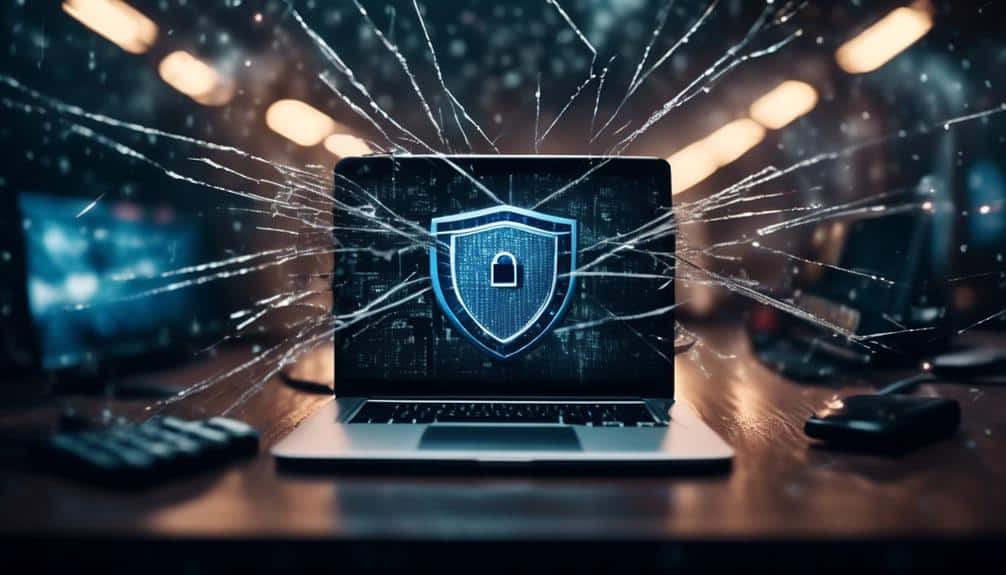Don't Miss: Key Tactics to Shield Your Website From Cyber Attacks
Secure your website from cyber attacks with these key tactics.
In today's digital landscape, the threat of malicious hackers looms large, ready to exploit any vulnerability they can find. But fear not, for there are effective measures you can take to safeguard your website and protect your valuable data.
From implementing strong password policies to regularly updating your software, these tactics will fortify your defenses against cyber attacks.
So, buckle up and prepare to fortify your website's security with these essential strategies.
Key Takeaways
- Implement strong password policies and enforce regular password updates to protect against unauthorized access.
- Keep software and applications updated to minimize vulnerabilities and stay ahead of evolving cybercriminal tactics.
- Regularly back up your website to ensure data safety and protection against cyber attacks.
- Utilize SSL certificates for secure communication and monitor and analyze website traffic to enhance security and user experience.
Importance of Cybersecurity

Protecting your website from cyber attacks is of utmost importance in today's digital landscape. The increasing connectivity and reliance on technology have exposed organizations to various cybersecurity challenges in the digital age. Hackers are constantly evolving their techniques, making it essential for businesses to stay ahead of the game.
Artificial intelligence (AI) plays a crucial role in enhancing cybersecurity measures. AI has revolutionized the way threats are detected and mitigated. It can analyze vast amounts of data in real-time, identifying patterns and anomalies that traditional security systems might miss. By using machine learning algorithms, AI can adapt and improve its detection capabilities, making it an invaluable asset in the fight against cyber attacks.
One of the main challenges in cybersecurity is the sheer volume and complexity of threats. With AI, organizations can automate the process of monitoring and analyzing network traffic, identifying potential threats and responding swiftly. AI-powered systems can also proactively identify vulnerabilities and recommend preventive measures to strengthen the overall security posture.
Additionally, AI can assist in reducing false positives, which can be time-consuming and resource-intensive to investigate. By filtering out false alarms, AI enables security teams to focus on genuine threats, ensuring a more efficient use of resources.
Understanding Different Types of Cyber Attacks
With your website's cybersecurity measures in place, it's crucial to understand the different types of cyber attacks that pose a threat to your organization. By familiarizing yourself with common cyber attack techniques, you can better protect your website and mitigate potential risks.
One common type of cyber attack is a phishing attack. This involves tricking individuals into revealing sensitive information, such as usernames and passwords, by impersonating a legitimate entity. Phishing attacks often occur through fake emails or websites designed to deceive users.
Another type of cyber attack is a malware attack. Malware, short for malicious software, is designed to infiltrate and damage computer systems. It can be spread through infected email attachments, malicious downloads, or compromised websites. Once installed, malware can steal sensitive data, disrupt system functionality, or even grant unauthorized access to attackers.
Recognizing signs of a cyber attack is crucial in mitigating its impact. Some common signs include unusual network activity, slow system performance, unexpected system crashes, or unauthorized access to sensitive data. Additionally, if employees receive suspicious emails or are asked to provide sensitive information, it's important to report and investigate these incidents promptly.
Understanding the different types of cyber attacks and recognizing their signs is essential for protecting your website and safeguarding your organization's sensitive information. By staying informed and implementing appropriate security measures, you can minimize the risk of falling victim to cyber attacks.
Implementing Strong Password Policies

To protect your website from cyber attacks, it's crucial to implement strong password policies.
This includes enforcing password complexity requirements, such as using a combination of uppercase and lowercase letters, numbers, and special characters.
Additionally, regular password updates should be enforced to ensure that passwords are regularly changed and not easily guessable.
Password Complexity Requirements
Implementing strong password policies is crucial for safeguarding your website against cyber attacks. Password complexity management is an effective way to enhance the security of user accounts. By enforcing certain requirements for password creation, such as including a combination of uppercase and lowercase letters, numbers, and special characters, you can significantly decrease the risk of unauthorized access. Additionally, implementing two-factor authentication adds an extra layer of security. This method requires users to provide a second form of authentication, such as a unique code sent to their mobile device, along with their password. By combining these two strategies, you can greatly reduce the chances of your website falling victim to password-related attacks.
| Requirement | Example | Importance |
|---|---|---|
| Length | Minimum 8 characters | High |
| Character variety | Mix of uppercase, lowercase, numbers, and special characters | High |
| Regular password updates | Every 90 days | Medium |
| Two-factor authentication | SMS code sent to mobile device | High |
Enforcing Regular Password Updates
To further enhance the security of user accounts, it's important to regularly update passwords and implement strong password policies. By enforcing regular password updates, you can minimize the risk of unauthorized access and protect your sensitive information.
Here are three key reasons why password expiration policies and password security awareness are crucial:
- Preventing password reuse: Regularly updating passwords reduces the chances of using the same password across multiple accounts, decreasing the impact of a potential breach.
- Mitigating the risk of brute-force attacks: Changing passwords frequently makes it harder for attackers to guess or crack passwords through automated methods.
- Ensuring compliance: Many regulatory frameworks, such as the Payment Card Industry Data Security Standard (PCI DSS), require password expiration policies to maintain compliance and protect customer data.
Keeping Software and Applications Updated
To shield your website from cyber attacks, it's crucial to keep your software and applications updated.
Timely updates are important because they often include security patches that address vulnerabilities and protect against new threats.
Outdated software poses a significant risk as hackers can exploit known vulnerabilities to gain unauthorized access to your website and compromise its security.
Importance of Timely Updates
Keeping your software and applications updated is crucial for safeguarding your website against cyber attacks. By staying up to date with timely patching and vulnerability management, you can enhance your website's security and protect it from potential threats.
Here are three reasons why timely updates are of utmost importance:
- Minimize vulnerabilities: Regular updates ensure that any known vulnerabilities in your software or applications are patched, reducing the risk of exploitation by hackers.
- Stay ahead of the game: Cybercriminals are constantly evolving their tactics. By regularly updating your software, you can stay one step ahead and protect your website from the latest threats.
- Maintain customer trust: A secure website builds trust with your customers. By keeping your software updated, you demonstrate your commitment to their safety and privacy, fostering a positive user experience.
Risks of Outdated Software
Outdated software and applications pose significant risks to the security of your website. When you fail to keep your software and applications updated, you become vulnerable to various cyber threats. One of the major risks is malware attacks.
Outdated software often has known vulnerabilities that can be exploited by hackers to gain unauthorized access to your website. This can lead to the installation of malware, which can cause serious damage to your website and compromise the security of your data.
Another consequence of using outdated software is the increased likelihood of data breaches. Outdated software may not have the necessary security patches and updates to protect against new and evolving threats, making your website an easy target for hackers.
Therefore, it's crucial to regularly update your software and applications to mitigate these risks and ensure the security of your website.
Regularly Backing Up Your Website

One way to ensure the security of your website is by regularly backing it up. Regular backups provide a safety net in case your website falls victim to cyber attacks or experiences data loss. By following this simple but essential practice, you can minimize the impact of such incidents and quickly restore your website to its previous state.
Here are three reasons why regularly backing up your website is crucial:
- Protection against website vulnerabilities: Websites are vulnerable to various threats, including malware, hacking attempts, and software vulnerabilities. Regular backups allow you to restore your website to a previous, uncompromised version if an attack occurs, ensuring that your visitors and their data remain safe.
- Safeguarding against data loss: Accidental deletion, hardware failures, or server crashes can lead to irreversible data loss. By backing up your website regularly, you can prevent the loss of valuable data and keep your website up and running without any interruptions.
- Enhanced data encryption: Regular backups provide an opportunity to update your data encryption mechanisms. By encrypting your backed-up data, you add an extra layer of protection, making it harder for cybercriminals to access and exploit sensitive information.
Utilizing SSL Certificates for Secure Communication
To ensure secure communication on your website, it is essential to utilize SSL certificates. SSL, or Secure Socket Layer, is a cryptographic protocol that provides a secure channel between a web server and a client. It encrypts sensitive information, such as passwords and credit card details, making it difficult for hackers to intercept and decipher the data.
By implementing SSL certificates, you can enjoy several benefits. Firstly, SSL helps protect your website and its visitors from cyber attacks. It safeguards against threats like data breaches, phishing, and man-in-the-middle attacks. Secondly, SSL certificates enhance your website's credibility and trustworthiness. When visitors see the padlock symbol or the HTTPS prefix in their browser's address bar, they know that their connection is secure and that your website is trustworthy.
The process of implementing SSL certificates involves a few steps. First, you need to obtain an SSL certificate from a trusted Certificate Authority (CA). Then, you need to install the certificate on your web server. Finally, you need to configure your website to use HTTPS instead of HTTP.
To help you understand the benefits and implementation process of SSL certificates, refer to the table below:
| SSL Certificate Benefits | SSL Implementation Process |
|---|---|
| Protects against cyber attacks | Obtain an SSL certificate from a trusted CA |
| Enhances website credibility | Install the certificate on your web server |
| Encrypts sensitive information | Configure your website to use HTTPS |
Monitoring and Analyzing Website Traffic

Monitoring and analyzing website traffic is crucial for understanding user behavior and optimizing your online presence. By keeping a close eye on your website's performance, you can uncover valuable insights that will help you serve your audience better. Here are three reasons why monitoring and analyzing website traffic is essential:
- Identify popular content: Analyzing user behavior allows you to determine which pages or articles on your website are generating the most traffic. This information helps you understand what content resonates with your audience and enables you to focus your efforts on creating more of it.
- Improve user experience: By monitoring website performance, you can identify any issues that may be causing slow loading times or errors. Addressing these issues promptly ensures that users can navigate your site smoothly, leading to a better overall experience.
- Optimize conversion rates: Analyzing user behavior provides valuable data on how visitors interact with your website. By understanding which pages or elements lead to conversions, you can optimize your website to encourage more conversions and achieve your business goals.
Taking the time to monitor and analyze your website's traffic not only helps you make data-driven decisions but also enables you to continuously improve the user experience. By doing so, you can better serve your audience and achieve your online objectives.
Educating Employees on Cybersecurity Best Practices
As you continue to enhance your website's performance by monitoring and analyzing its traffic, an equally important aspect to consider is educating your employees on cybersecurity best practices. Cybersecurity training and employee awareness play a crucial role in safeguarding your website from cyber attacks. By equipping your employees with the knowledge and skills to identify and respond to potential threats, you can significantly reduce the risk of a successful attack.
To help you in this endeavor, here is a table outlining key cybersecurity best practices that should be included in your employee training program:
| Best Practice | Description | Importance |
|---|---|---|
| Strong Passwords | Encourage the use of complex passwords that include a combination of letters, numbers, and special characters. | High |
| Phishing Awareness | Teach employees how to recognize and report phishing emails or suspicious online activities. | High |
| Software Updates | Emphasize the importance of regularly updating software and applications to patch any vulnerabilities. | Medium |
| Data Backup | Educate employees on the importance of regularly backing up critical data to prevent loss in case of a breach. | Medium |
| Mobile Security | Train employees on the risks associated with using mobile devices and the necessary security measures to protect sensitive information. | Low |
Frequently Asked Questions
How Can I Detect if My Website Has Been Compromised by a Cyber Attack?
To detect if your website has been compromised by a cyber attack, utilize website security tools. Be proactive in preventing attacks by implementing steps such as regular updates, strong passwords, and secure hosting.
What Are Some Common Signs of a Phishing Attack Targeting My Website?
Warning signs of a phishing attack targeting your website include suspicious emails, unfamiliar URLs, and unexpected pop-ups. Take preventive measures by educating yourself and your team, implementing strong security measures, and regularly monitoring your website for any signs of compromise.
Are There Any Specific Industries or Types of Websites That Are More Vulnerable to Cyber Attacks?
Industries or website types more vulnerable to cyber attacks can vary. However, small businesses may be impacted disproportionately. E-commerce sites can strengthen security by implementing strategies such as regular updates, strong passwords, and encryption.
What Should I Do if My Website Has Been Hacked?
If your website has been hacked, start by isolating the affected server and taking it offline. Next, remove the malicious code and restore from a clean backup. Strengthen security measures to prevent future attacks.
How Often Should I Update My Website's Security Measures to Stay Protected From Cyber Attacks?
Regularly updating your website's security measures is crucial to staying protected from cyber attacks. Incorporating best practices such as conducting regular security audits ensures that your website remains secure and safeguards your valuable data.
Conclusion
To protect your website from cyber attacks, it's crucial to prioritize cybersecurity.
By implementing strong password policies, regularly updating software, and backing up your website, you can safeguard against potential threats.
Utilizing SSL certificates and monitoring website traffic are also effective measures to ensure secure communication.
Lastly, educating employees on cybersecurity best practices will further strengthen your defenses.
By following these key tactics, you can shield your website from cyber attacks and maintain a secure online presence.








